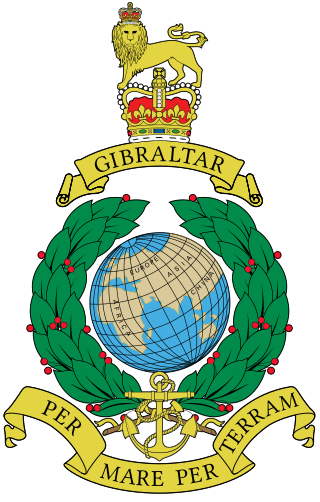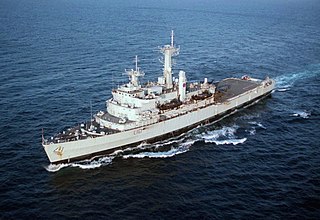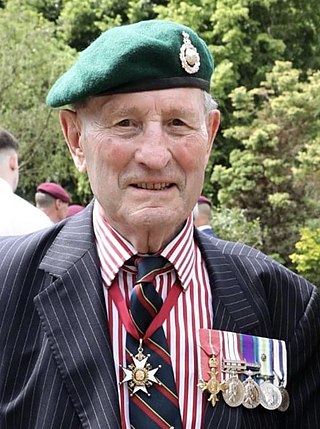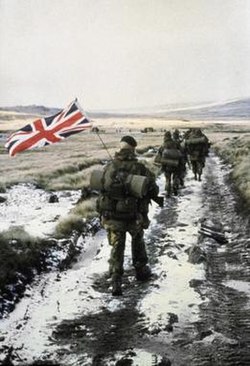
The Falklands War was a ten-week undeclared war between Argentina and the United Kingdom in 1982 over two British dependent territories in the South Atlantic: the Falkland Islands and its territorial dependency, South Georgia and the South Sandwich Islands. The conflict began on 2 April 1982, when Argentina invaded and occupied the Falkland Islands, followed by the invasion of South Georgia the next day. On 5 April, the British government dispatched a naval task force to engage the Argentine Navy and Air Force before making an amphibious assault on the islands. The conflict lasted 74 days and ended with an Argentine surrender on 14 June, returning the islands to British control. In total, 649 Argentine military personnel, 255 British military personnel, and three Falkland Islanders were killed during the hostilities.

The Royal Marines, also known as the Royal Marines Commandos, and officially as the Corps of Royal Marines, are the United Kingdom's amphibious special operations capable commando force, one of the five fighting arms of the Royal Navy, and provide a company strength unit to the Special Forces Support Group (SFSG). The Royal Marines trace their origins back to the formation of the "Duke of York and Albany's maritime regiment of Foot" on 28 October 1664, and the first Royal Marines Commando unit was formed at Deal in Kent on 14 February 1942 and designated "The Royal Marine Commando".

HMS Antelope was a Type 21 frigate of the Royal Navy that participated in the Falklands War and was sunk by Argentine aircraft.

The Battle of Mount Harriet was an engagement of the Falklands War, which took place on the night of 11/12 June 1982 between British and Argentine forces. It was one of three battles in a Brigade-size operation all on the same night, the other two being the Battle of Mount Longdon and the Battle of Two Sisters.
The Battle of Two Sisters was an engagement of the Falklands War during the British advance towards the capital, Port Stanley. It took place from 11 to 12 June 1982 and was one of three battles in a Brigade-size operation all on the same night, the other two being the Battle of Mount Longdon and the Battle of Mount Harriet. It was fought mainly between an assaulting British force consisting of Royal Marines of 45 Commando and an Argentine Company drawn from 4th Infantry Regiment.

HMS Fearless (L10) was a Royal Navy amphibious assault ship that served from 1965 until 2002. One of two Fearless-class landing platform docks, she was based in HMNB Portsmouth and saw service around the world over her 37-year life. She was the last steam-powered surface ship in the Royal Navy.

The invasion of the Falkland Islands, code-named Operation Rosario, was a military operation launched by Argentine forces on 2 April 1982, to capture the Falkland Islands, and served as a catalyst for the subsequent Falklands War. The Argentines mounted amphibious landings and the invasion ended with the surrender of Falkland Government House.

847 Naval Air Squadron is a squadron of the Royal Navy Fleet Air Arm. It operates AgustaWestland Wildcat AH.1 helicopters and provides armed reconnaissance and light transport support to UK Commando Force. Along with 845 and 846 naval air squadrons, it forms part of the Commando Helicopter Force. The squadron was re-formed from 3 Commando Brigade Air Squadron on 1 September 1995.
The Skirmish at Top Malo House took place on 31 May 1982 during the Falklands War between Argentine special forces from 602 Commando Company and the British Royal Marines of the Mountain and Arctic Warfare Cadre (M&AWC). Top Malo House was the only planned daylight action of the war, although it was intended to take place in darkness. The Argentine commandos were part of an attempt to establish a screen of observation posts. A section that occupied Top Malo House was sighted by a British observation post of the Mountain and Arctic Warfare Cadre that was screening the British breakout from the lodgement around San Carlos. The action at Top Malo House was one of a series of mishaps and misfortunes that afflicted the Argentine effort.

Major General Julian Howard Atherden Thompson, is a military historian and former Royal Marines officer who commanded 3 Commando Brigade during the Falklands War.
The history of the Royal Marines began on 28 October 1664 with the formation of the Duke of York and Albany's Maritime Regiment of Foot soon becoming known as the Admiral's Regiment. During the War of the Spanish Succession the most historic achievement of the Marines was the capture of the mole during the assault on Gibraltar in 1704. On 5 April 1755, His Majesty's Marine Forces, fifty Companies in three Divisions, headquartered at Portsmouth, Chatham and Plymouth, were formed by Order of Council under Admiralty control.

The 1982 British military campaign to recapture the Falkland Islands depended on complex logistical arrangements. The logistical difficulties of operating 7,000 nautical miles from home were formidable. The Argentine invasion of the Falkland Islands came at a time when the Royal Navy was experiencing a reduction in its amphibious capability, but it still possessed the aircraft carriers HMS Hermes and Invincible, the landing platform dock (LPD) ships HMS Fearless and Intrepid, and six landing ship logistics (LSL) ships. To provide the necessary logistic support, the Royal Navy's ships were augmented by ships taken up from trade (STUFT).

A loaded march is a relatively fast march over distance carrying a load and is a common military exercise.

The invasion of South Georgia, also known as the Battle of Grytviken or Operation Georgias, took place on 3 April 1982, when Argentine Navy forces seized control of the east coast of South Georgia after overpowering a small group of Royal Marines at Grytviken. Though outnumbered, the Royal Marines shot down a helicopter and hit the Argentine corvette ARA Guerrico several times before being forced to surrender. It was one of the first episodes of the Falklands War, immediately succeeding the invasion on the Falkland Islands the day before.

The Bluff Cove air attacks occurred 8 June 1982, during the Falklands War. British troop transport ships were bombed by Argentine Air Force (FAA) Douglas A-4 Skyhawk fighter bombers at Port Pleasant, off Fitz Roy, while transferring troops to Bluff Cove, with significant damage and casualties.
The Battle of Mount Kent was a series of engagements during the Falklands War, primarily between British and Argentine special forces.

3 Commando Brigade Air Squadron, Royal Marines, was formed in 1968 in Singapore by the amalgamation of three Commando Air Troops and the Brigade Flight. The squadron moved to Plymouth in 1971 and the two remaining UK Commando Air Troops became part of it. Apart from during the Falklands War, when the whole squadron was involved, it operated mostly on individual flight detachments. 3 Commando Brigade Air Squadron became 847 Naval Air Squadron in 1995.

The Dartmoor Yomp is an annual charitable fundraising event run in aid of the various charities that support injured British Armed Forces Royal Marines. The Yomp is a daytime trek held in the Dartmoor National Park in the county of Devon, England, usually some 12 miles (19 km) in length, and is undertaken by disabled servicemen joined by able-bodied former and serving Royal Marines and their immediate families. The challenge is usually held over two days in September: a get-together on the Friday and the actual Yomp on the Saturday. The Dartmoor Yomp takes its name from the Royal Marines slang term "yomp", meaning a route march carrying full kit. It was founded in 2008.
The 25th Mechanized Infantry Regiment is an infantry unit of the Argentine Army belonging to the 9th Mechanized Brigade, 3rd Army Division, and based at Sarmiento, Chubut, Argentina. This Regiment was the first army unit to land in the Falkland Islands on 2 April 1982 and fought in the Falklands War.

Eagle Trap is a novel by British writer Geoffrey Archer, published in 1993 by Bantam Press. The story concerns an Royal Marines officer tasked to stop a nuclear Terror attack.
















